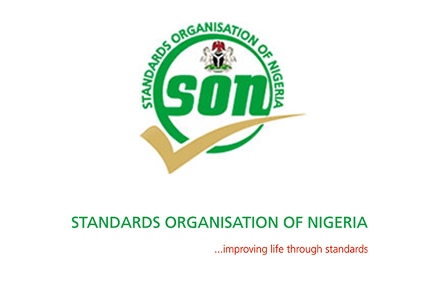The Standards Organisation of Nigeria (SON) and stakeholders in the food industry have collaborated to develop new standards that would improve the production processes of plastics in the country and save the nation huge amounts of forex that would have gone into importation of these products.
Records show that Nigeria is the third-largest importer of plastics in primary forms after Egypt, and has only 30 percent capacity to produce locally, while the remaining 70 percent is currently being imported.
The standards, SON said in a statement, would ensure the safety and manufacturing of high-quality products, leading to an increase of its use, providing opportunities for employment rather than expending the nation’s foreign exchange on importation.
According to SON, the need to develop the standards follows recent coordination by the Federal Ministry of Environment to develop a national policy for the lifecycle of plastics in the country.
The Director-General of SON, Osita Aboloma said at a technical committee meeting on polymer and related products, that there has been demand for the standard for recycled plastics by stakeholders, the private sector and manufacturers, stressing that for the national policy of the Federal Ministry of Environment to gain ground, it must be backed by standards.
“So, this meeting would not have come at a better time and also with the rising concerns over the use of recycled pet bottles in the food industry,” he said.
Aboloma, represented by the Director, Standards Development, SON, Chinyere Egwuonwu, said it would also give consumers and producers the confidence that the products and services they are developing or using are safe, reliable and that it would also keep the environment safe.
“The recycling of pet bottle packaging represents one of the most successful and widespread examples of plastic packaging recycling.
The growth in the collection and processing of pet bottles for food packaging applications has been increasing significantly over the last 10 years and has been accomplished by significant investments in plastic recovery facilities and food-grade recycled pet processing.
The food and beverage recycling association of Nigeria remains the driving force for the development of this standard.
“Today, we have a draft national policy on the life cycle of plastics with the recycling of plastic waste as one of the strategies. The draft policy has been extensively discussed by all relevant stakeholders and it is currently being processed for approval by the relevant government agency.”
He urged stakeholders to study the document and come up with a workable standard that would guide manufacturers, promote trade and assist regulation to guarantee acceptability without compromising the safety of the product and the environment.
The chairman of the Committee from the Department of Chemical and Petroleum and Gas Engineering, University of Lagos, Prof. Abiola John Kehinde, commended SON for creating the platform for developing the standards, saying that it would go a long way to educate manufacturers on what was expected of them, while also making the environment safe.
“This is a meeting where all the necessary inputs for developing the standards are being discussed,” he said.
The Deputy Director, Standard Development and Group Head, Chemical Technology Group, SON, Agboola Afolayan, said the standard is very special because it deals with recycled pet bottles for food application
“There are heaps of plastic wastes everywhere in the country and it is becoming an international embarrassment. Our environment is feeling the negative impact of this situation and our drainages are blocked by the littering of plastic pet bottles. If we want to recycle well, there must be a standard that will guarantee the requirements and which must be consistent with international best practices,” he said.
Also, SON said it has approved a new set of 128 Nigeria Industrial Standards (NIS) to boost the nation’s manufacturing sector.
The move according to the standards body was to contribute its own quota to the real sector of the economy, while also making the sector competitive.
The Director General, SON, Osita Aboloma, at the Nigerian Standards Council 5th meeting held in Lagos, said the standards were also ready for publication, dissemination and use by stakeholders in Nigeria to drive economic advancement by processors, assemblers, Importers of products and services.
Aboloma said the approval by the SON Council would further boost industrial and commercial activities in the country in view of the imminent implementation of the African Continent Free Trade Agreement (AfCFTA).
According to him, the agreement has further necessitated rapid development and harmonisation of standards, conformity assessment procedures, as well as mutual recognition of quality marks, to cover all sectors and facilitate trade across the continent through the elimination of technical barriers.
He enumerated areas covered by the approved standards as including civil/building technology, chemical technology, electrical and electronics, food/codex, petroleum products as well as liquefied petroleum cylinders among others.
In his opening remarks, Council Chairman, Mr. Edet Akpan, Permanent Secretary, Federal Ministry of Industry, Trade and Investment congratulated the SON Management for its promptness in dealing with staff promotions and disciplinary matters.
He enjoined the Council members to continue to bring their rich knowledge and experiences to bear in assisting SON deliver on its mandate, stressing that quality was a moving target that requires continual improvement in service delivery by the organisation.
The Standards Council is an 18 member body recognized by law to provide policy direction in carrying out the organisation’s mandate of standards development, conformity assessment and Metrology assurance amongst others.
Its members are drawn from ministries, department and agencies of government, the organised private sector and professional associations, including the Director General, SON.
Mr Kunle Oluseyi, Chairman, Food and Beverages Recycling Alliance said the standard would serve Nigeria from environmental degradation and foreign exchange.
He said the Nigeria Food and Beverages, and polymer products industries were the fastest growing sector in Africa, adding that the sector needed the standard to reduce reliance on import of primary polymer.
Source: THISDAY












